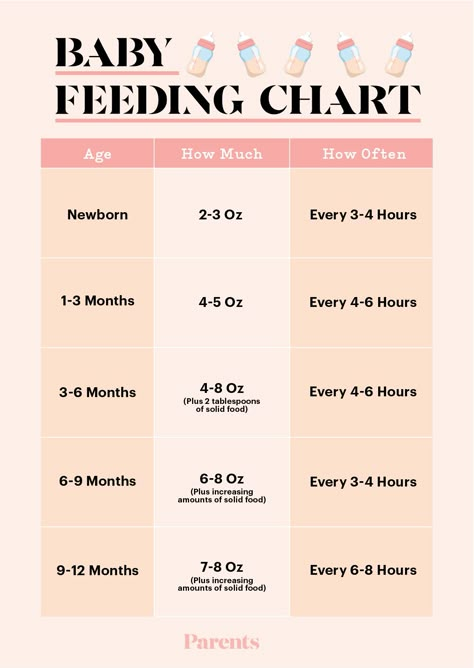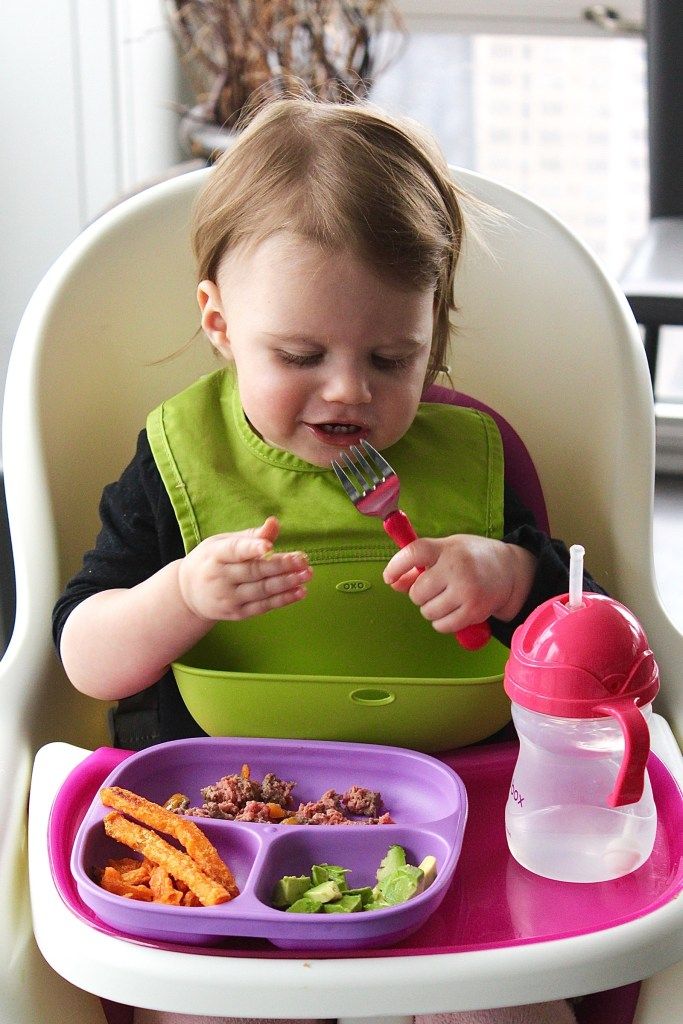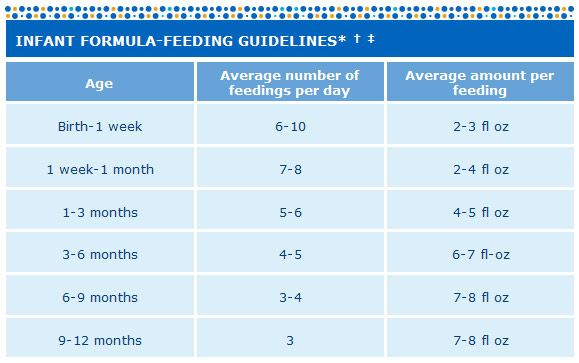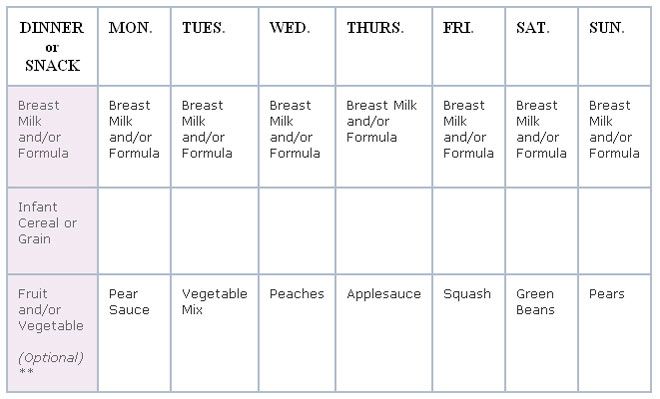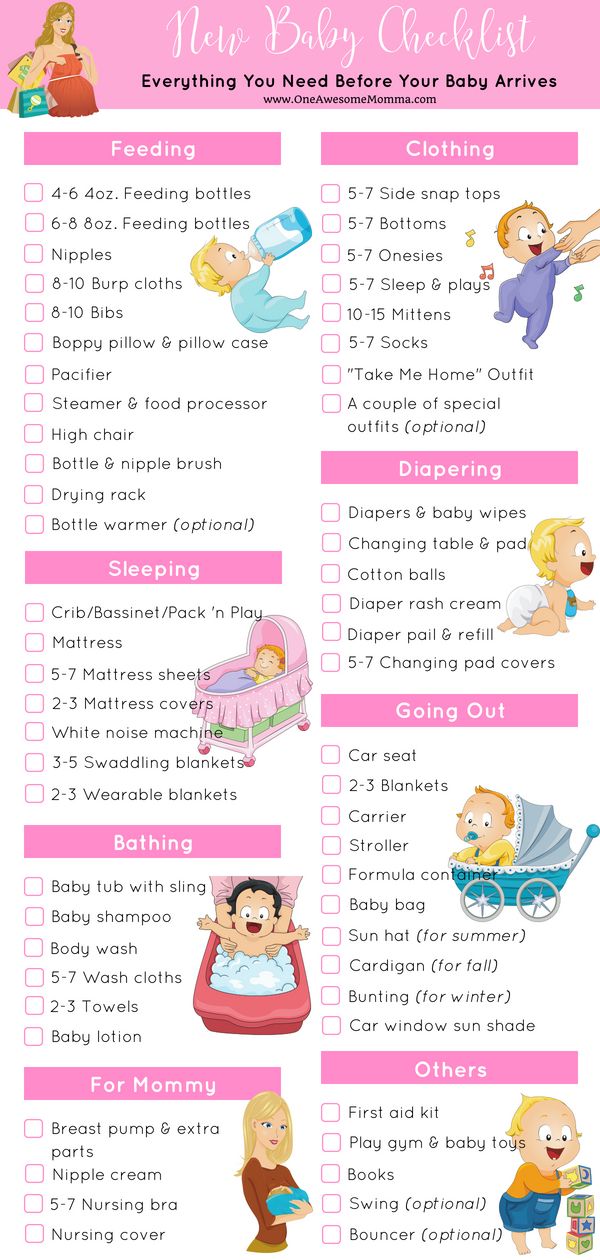How often baby feed at night
Night Feedings by Age: Nighttime Feeding Schedule
Skip to contentNow reading: Night Feedings by Age: Normal Nighttime Feeding Schedule
PrevNextNewborn Nighttime Feeding Routines - Our Thorough Guideline
As new parents, I think we all spend a lot of time worrying if we're getting it all "right." Entering the most difficult and important journey of our lives with basically zero training can be scary. But there really isn't one way to do things when it comes to parenting. That's why guidelines can be so helpful when it comes to making decisions for your new baby. Having an outline that offers best practices and recommendations, with enough wiggle room for you to do what's best for your baby ensures she will have everything she needs to thrive. Today, we're giving you a thorough guideline on a normal nighttime feeding schedule for your baby. Because we could all use a starting point even if mom really does know best!
When determining a feeding schedule that works best for your baby, the main consideration will be their age. Babies grow very quickly, and their feeding schedules can look very different from one month to the next.
As you're using this to plan your baby's nighttime feeding, remember that your baby is a unique individual who won't necessarily follow this outline exactly. That's totally OK!
Normal Nighttime Feeding Schedule by Age
For the purpose of this outline, understand that we refer to your baby's "nighttime" as a 12-hour period, such as 7 pm - 7 am. Additionally, you'll see that breastfed babies will need to eat more frequently than formula-fed babies as a general rule. That's because breastmilk is digested more quickly than formula.
0 - 2 Months
"Schedule" isn't really a word that is conducive to your baby at this age. Still early on in what's often referred to as the fourth trimester (read our article to find out what that's all about), your baby's digestive system is still very immature. Their tummy is also still very tiny! Therefore, trying to implement any sort of schedule with your newborn is only going to cause a lot of anxiety for both you and your baby.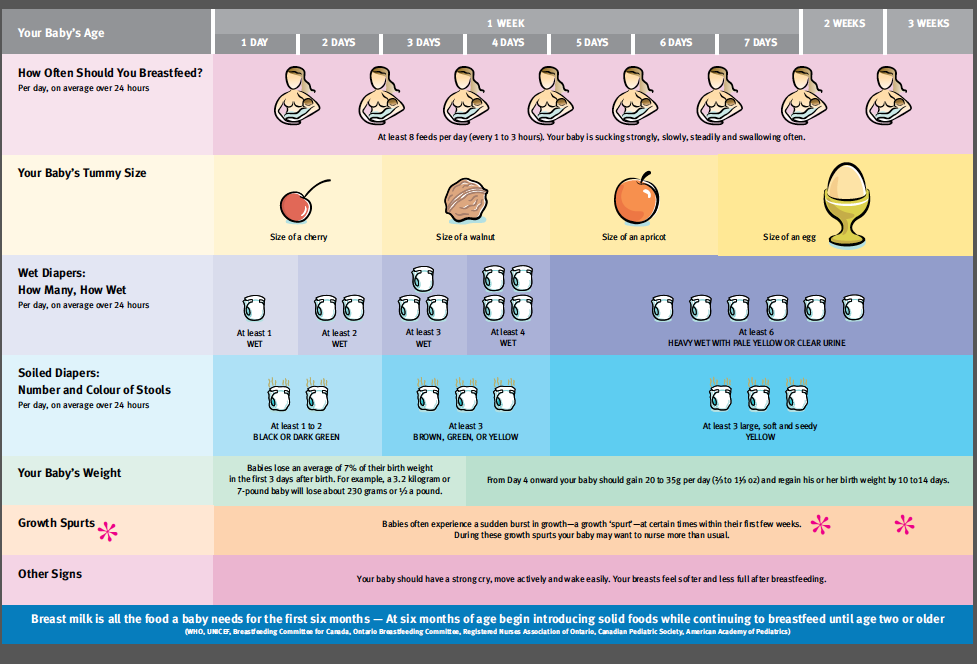
Instead of implementing a schedule with your baby at this age, you really want to tune into their needs. Feeding on demand, swaddling your baby to replicate a womb-like environment, and keeping your baby close to you are the best ways for your baby and you to sleep as much possible to get through those frequent night feedings.
Though a schedule isn't a good idea at this age, you do want to aim for full feedings so your baby can stretch longer between feeds. Also keeping your baby consistently feeding every 3 hours by day (without ever napping more than 2 hours) will help them sleep longer stretches at night.
Here's how often you can expect your baby to eat at night during the 0 - 2 month age timeframe:
- Breastfed Babies - 3 to 5 feedings per night.
- Formula-fed Babies - 2 to 4 feedings per night.
Unless you've gotten approval from your doctor, it's best not to let your baby ever go longer than 3-4 hours between feedings at this age in order to stimulate proper growth.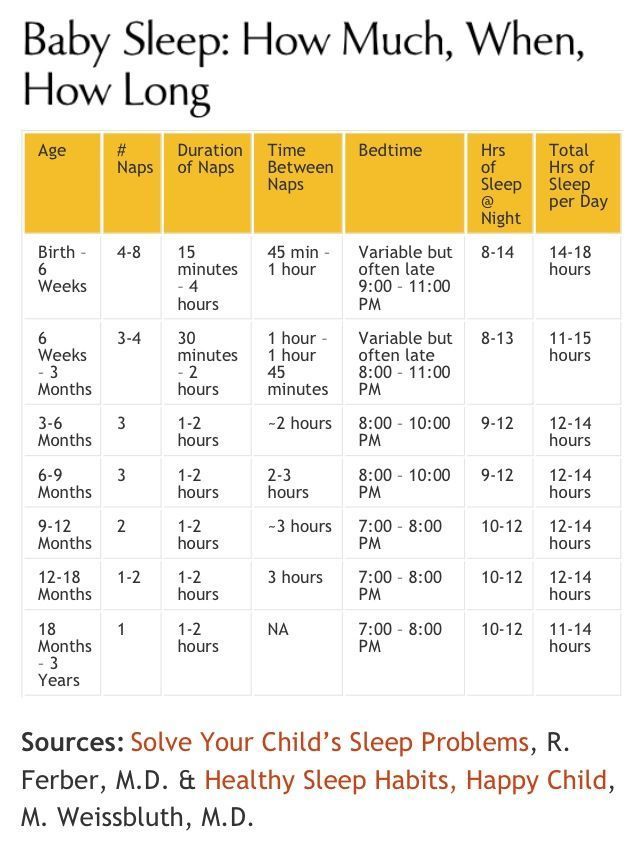
3 - 4 Months
By this age, your baby can start sleeping a bit longer. As long as your baby is growing well, your doctor will probably tell you that you don't have to wake your baby every 3-4 hours to feed anymore. But that doesn't mean that they won't still wake up during the night to feed. A priority during these months is getting your baby into a good nighttime routine so that they learn to fall asleep on their own as well as fall back to sleep quickly after a night feeding.
Things like dimming the lights, using a white noise machine, or using a weighted sleep sack for your baby (like this one from Dreamland Baby), are all ways to help your baby get to sleep more quickly on their own.
At this age, feeding your baby a few times per night is still very normal (no matter what your friends try to tell you). In fact, we recently wrote about the top 5 reasons babies won't sleep and the number one reason is hunger. If your baby is crying at night, they most likely need to eat.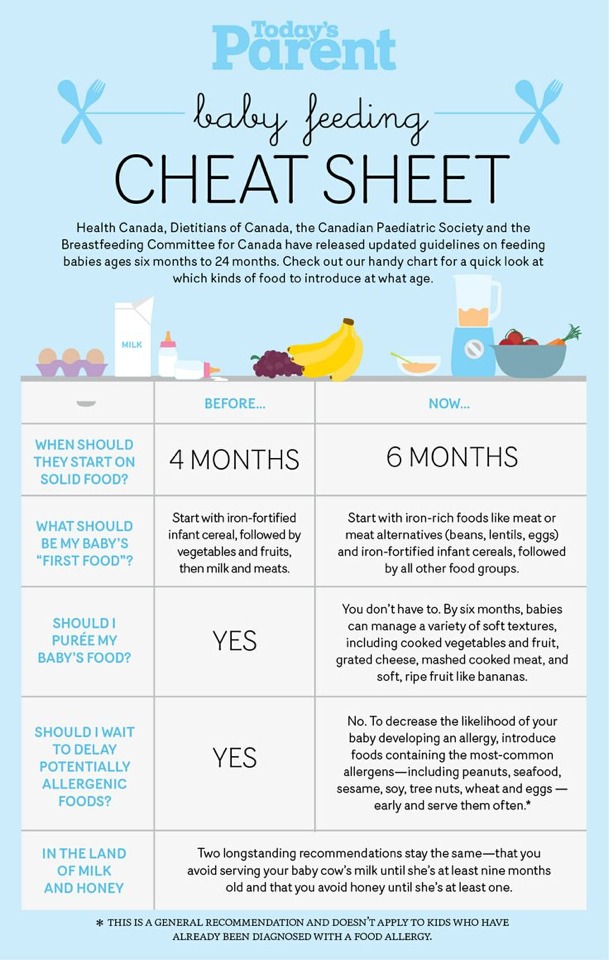
Here's how often you can expect your baby to eat at night during the 3 - 4 month age timeframe:
- Breastfed Babies - 3 to 4 feedings per night
- Formula-fed Babies - 2 to 3 feedings per night
Some babies are capable of sleeping in close to "through the night" stretches of 7-8 hours at this age. But it's not the norm. And even if they are, the 4-month sleep regression will also kick in at some point. Even a baby who had been sleeping very well might start to wake more. If you need to feed more through this transition, don't worry too much, but it's a good time to focus on helping your baby to keep working on going back to sleep independently.
Pro Tip: This is a great time to implement the dream feed so that YOU can sleep a longer stretch. Read all about how to implement it here.
5 - 6 Months
That 4-month sleep regression can really do a number on parents. You'll think you're on your way to sleep when suddenly you feel like you're right back where you started. Luckily, it doesn't last!
You'll think you're on your way to sleep when suddenly you feel like you're right back where you started. Luckily, it doesn't last!
By 5- 6 months, most parents are starting to see their babies sleep in longer stretches at night on a consistent basis.
This is also the age at which most doctors, including the AAP, recommend you begin feeding your baby solid food. However, most babies take in very little solid food in the beginning, so it doesn't really change how much breastmilk or formula your baby takes in. Breastmilk or formula will continue to be your baby's primary source of nutrition until their first birthday. And it's a myth that more solid food will help your baby sleep longer at night.
What IS happening is that your baby is growing. So is their tummy. They can take in a lot more milk at one feeding, which means everyone is able to get a lot more sleep at night.
Here's how often you can expect your baby to eat at night during the 5 - 6 month age timeframe:
- Breastfed Babies - 1 - 3 feedings per night
- Formula-fed Babies - 1 - 2 feedings per night
In order to have similar results to this, be sure to continue a 3-4 hour feeding schedule during the day for your little one.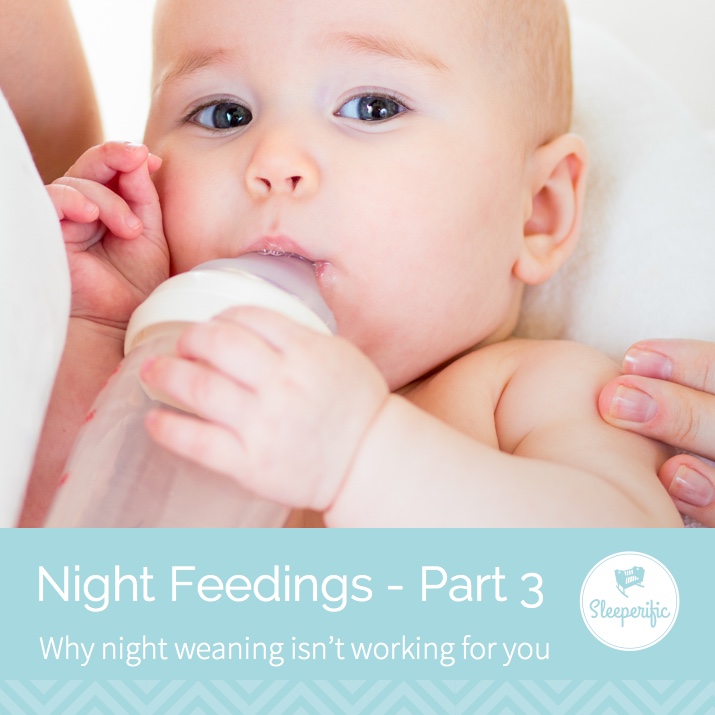 This will ensure they have full tummies when they head off to dreamland.
This will ensure they have full tummies when they head off to dreamland.
7 - 9 Months
These are the first months where more babies start to sleep through the night then don't. Hooray!!
If you've set your baby up for success with a solid nightly routine as well as worked hard to teach them to self-soothe to put themselves back to sleep on their own, it's very likely he will no longer wake in the middle of the night to eat.
Here's how often you can expect your baby to eat at night during the 7 - 9 month age timeframe:
- Breastfed Babies - 0 to 3 feedings per night
- Formula-fed Babies - 0 to 1 feeding per night
There will be some babies who still need an extra feeding at this age, especially toward the younger end. Don't be discouraged if your baby is still waking to eat a minimal amount during the night. However, it is recommended that you do attempt night weaning as they near their 9-month birthday if you feel your baby is ready to sleep through the night.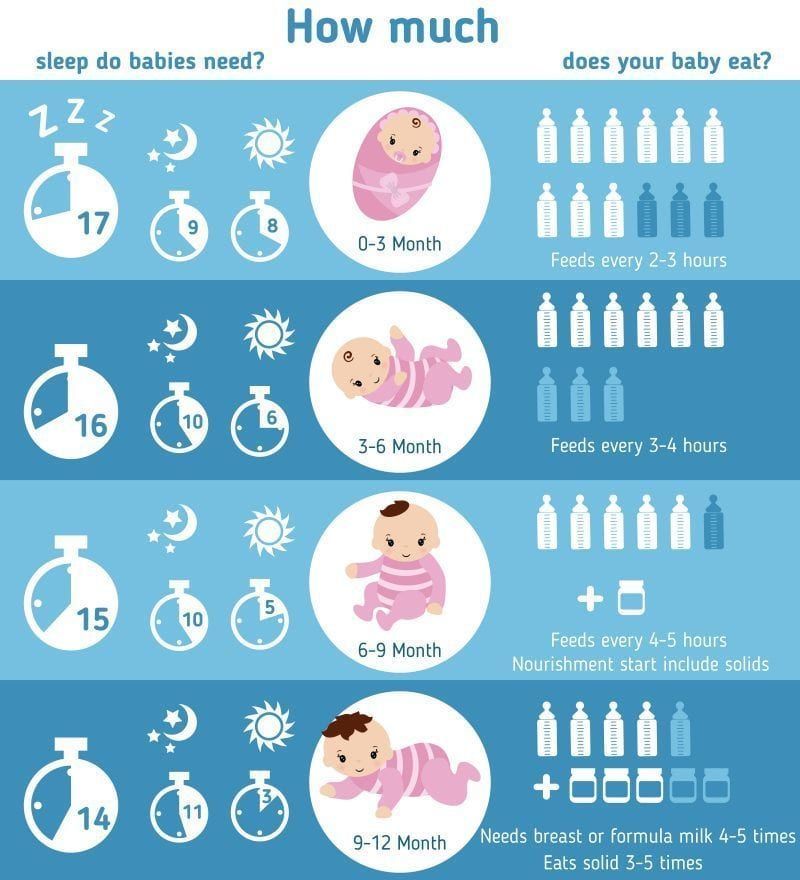 You'll be so well-rested when they do you won't even know what to do with yourself!
You'll be so well-rested when they do you won't even know what to do with yourself!
Shop Dreamland Baby
10 - 12 Months
By the 10 - 12 month age timeframe, the majority of babies are capable of sleeping through the night. And not just the 8-hour stretch you so longed for those first few months. Older infants are now capable of sleeping 10 - 12 hours straight. And when they do, you will feel like the fog has finally lifted. By the end of that first year, most parents are rejoicing in the fact that their little ones are finally sleeping through the night.
Here's how often you can expect your baby to eat at night during the 10 - 12 month age timeframe:
- Breastfed Babies - 0 to 2 feedings per night
- Formula-fed Babies - 0 to 1 feeding per night
Nutrition-wise, most babies no longer need to wake up to eat in the middle of the night at this age. This is especially true for formula-fed babies. However, if you haven't established good routines with your baby, they may still wake up. If this is still happening, it's time to really focus on cutting out the nighttime feedings. More likely than not, your baby is not waking out of hunger.
However, if you haven't established good routines with your baby, they may still wake up. If this is still happening, it's time to really focus on cutting out the nighttime feedings. More likely than not, your baby is not waking out of hunger.
Conclusion
The first year of your baby's life will be both one of the best as well as one of the most exhausting of your life. We know how hard parents work to help their babies thrive and be happy. When your baby isn't sleeping, it can put stress on everyone in the family. But you can see from this nighttime feeding schedule guideline that a baby waking up to eat is the norm, whereas young babies who sleep through the night is more of an exception. Often having unrealistic expectations makes the process that much harder.
If your baby is still waking to eat, just relax and know you're giving them exactly what they need. Like anything, it won't last forever.
See our other favorite posts for further reading:
- Weighted Sleep Sack Safety and How It Will Help Your Baby Sleep
- How To Stop Startle & Moro Reflex Without Swaddling
- Baby Napping Close to Bedtime and How to Do It Right
- The Best Wearable Blankets
- How to Get Your Baby to Sleep Without Nursing
- Best Swaddle for Newborns
- Signs It’s Time to Stop Swaddling Your Baby
- Are Sleep Sacks Safe for Babies Who Can Roll Over?
- How to Get an Overtired Baby to Sleep
- How to Wash & Clean Your Dreamland Baby Sleep Sack
- How to Stop the 45-Minute Intruder During Your Baby's Naps
- How To Swaddle Your Dreamland Baby
- Cluster Feeding at Night: Why Babies Do It and How to Manage It
- Know the Facts: What's Safe and What's Not for Baby's Tummy Sleep
- How Should A Sleep Sack Fit?
4 Common Breastfeeding Challenges and How to Overcome Them
A New Mom's Sleep Deprivation Story
Breastfeeding at night - La Leche League GB
Breastfeeding at night is one of the most discussed topics at La Leche League meetings, both in person and online.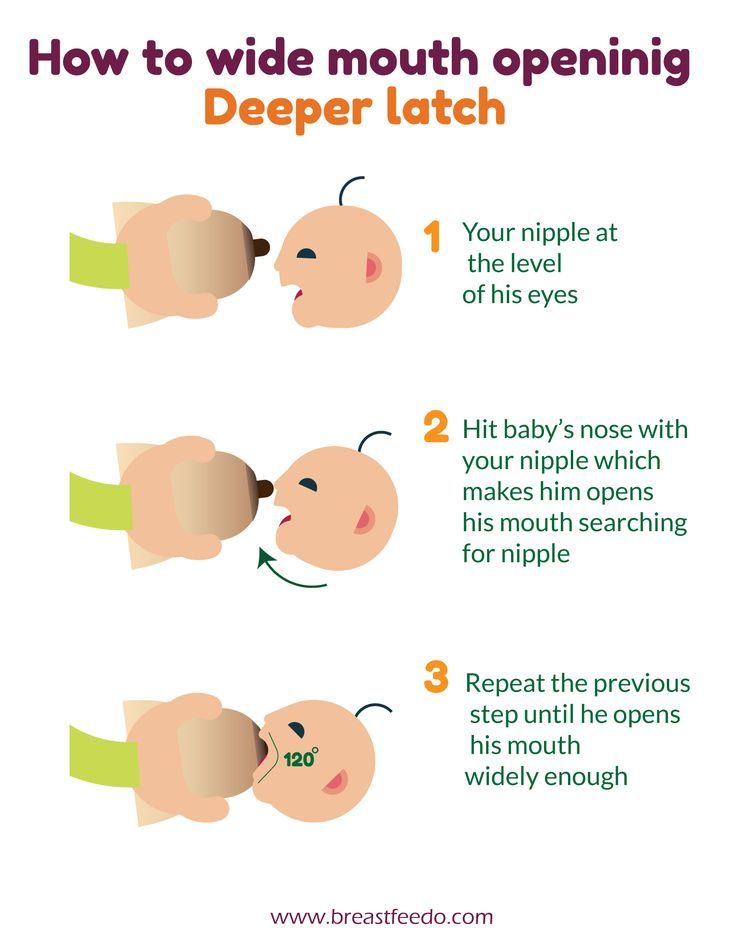 This is often because breastfeeding at night, especially in the early days, can be so important to establishing a successful breastfeeding relationship. It is also because of its inextricable link with the topic of sleep, which can be one of the biggest changes many mothers and families experience when they have a new child.
This is often because breastfeeding at night, especially in the early days, can be so important to establishing a successful breastfeeding relationship. It is also because of its inextricable link with the topic of sleep, which can be one of the biggest changes many mothers and families experience when they have a new child.
There is no doubt that caring for a new baby can be exhausting, especially if you feel you are not getting enough sleep. Understanding why breastfeeding at night is so important can help. There is a huge amount of both reliable and rather less reliable information on the internet and in countless parenting books about what infant sleep ‘ought’ to be like, and therefore what infant night-time feeding ‘ought’ to be like. This article is designed to give mothers and parents the information and reassurance they need to inform their own night-time breastfeeding approach, including some helpful tips on how to get more rest when you can.
Breastfeeding at night in the early weeks and months is normal and important
Babies wake to feed at night in the early weeks and months (and often beyond) for a number of important reasons. Breastfeeding at night is a vital part of establishing and maintaining a good milk supply and ensuring that newborn babies get all the milk they need to grow and thrive. Breastmilk works on a supply and demand basis: the more milk that is removed, the more milk your breasts make. For the majority of mothers, this means milk needs to be removed roughly every 2-3 hours in the early weeks. Although some babies may sleep for slightly longer periods overnight, perhaps 3-4 hour stretches, newborn babies will typically wake several times a night to feed. This also helps to ensure that you don’t get engorged breasts, which may lead to blocked ducts or mastitis.
Breastfeeding at night is a vital part of establishing and maintaining a good milk supply and ensuring that newborn babies get all the milk they need to grow and thrive. Breastmilk works on a supply and demand basis: the more milk that is removed, the more milk your breasts make. For the majority of mothers, this means milk needs to be removed roughly every 2-3 hours in the early weeks. Although some babies may sleep for slightly longer periods overnight, perhaps 3-4 hour stretches, newborn babies will typically wake several times a night to feed. This also helps to ensure that you don’t get engorged breasts, which may lead to blocked ducts or mastitis.
Newborn babies often wake to feed because their bodies have signalled that they are hungry. However, newborns (and babies and children of all ages) also wake at night for many other reasons, including being scared or uncomfortable, being hot or cold, feeling the need for comfort and connection, and so on. As adults, we have developed ways of meeting these needs ourselves – adjusting a pillow, having a sip of water, cuddling our partner. As babies have no way of independently meeting these needs, they rely on their mother or parent to meet them. Breastfeeding at night offers mothers a way of easily and conveniently meeting the vast majority of these needs in one go.
As babies have no way of independently meeting these needs, they rely on their mother or parent to meet them. Breastfeeding at night offers mothers a way of easily and conveniently meeting the vast majority of these needs in one go.
Lots of research shows that night waking is the biological norm for babies.i You can read more about it here as well as in Sweet Sleep, La Leche League International’s exhaustive publication on nights and naps for breastfeeding families. Research also shows that, overall, breastfeeding mothers get more sleep than mixed- and formula-feeding mothers. This is for a number of reasons, including the impact of natural hormones and chemicals released for baby and mother when breastfeeding at night. There is also a perception that babies who have formula milk sleep longer than breastfed babies. Evidence shows this is not the case.ii “Despite the common perception that supplementing an infant’s diet with formula milk or solid food will promote sleep, a recent study found that there was no difference in the frequency of night waking between breastfeeding and formula feeding infants aged 6-12 months old.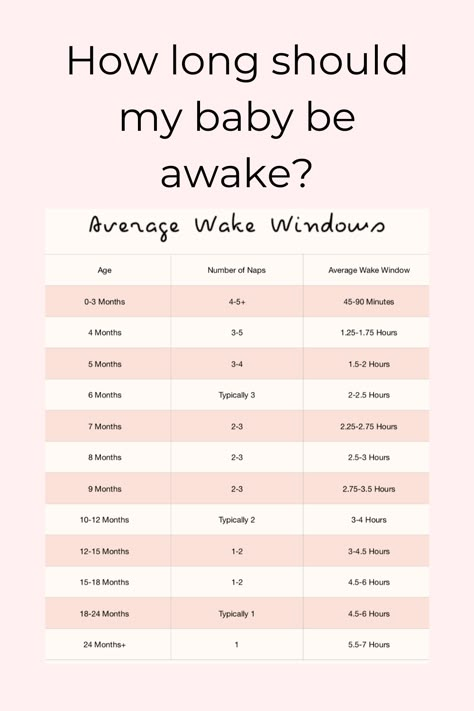 Infants who received more milk or solid feeds during the day were less likely to feed at night but not less likely to wake.”iii
Infants who received more milk or solid feeds during the day were less likely to feed at night but not less likely to wake.”iii
Breastmilk at night
Research shows that breastmilk changes all the time, in response to all sorts of things, like the needs and health of your baby, temperature, and the time of day. For most mothers, breastmilk will gradually increase in fat content throughout the day. During the evening, young babies often cluster feed, taking in frequent feeds of this fattier milk, which tends to satisfy them enough to have their longest stretch of sleep. This cluster feeding in the early months may go on late into the evening when you were hoping you would be asleep, which can naturally feel exhausting.
Overnight, your prolactin levels – the hormone designed to support milk production – are at their highest. So, when your baby feeds frequently at night, the message to your body to boost milk supply is even stronger. Breastmilk at night is also high in the amino acid tryptophan, which in turn helps your baby to make melatonin, which is used by the body to develop its circadian rhythm (our internal system for recognising the difference between day and night) and to sleep better.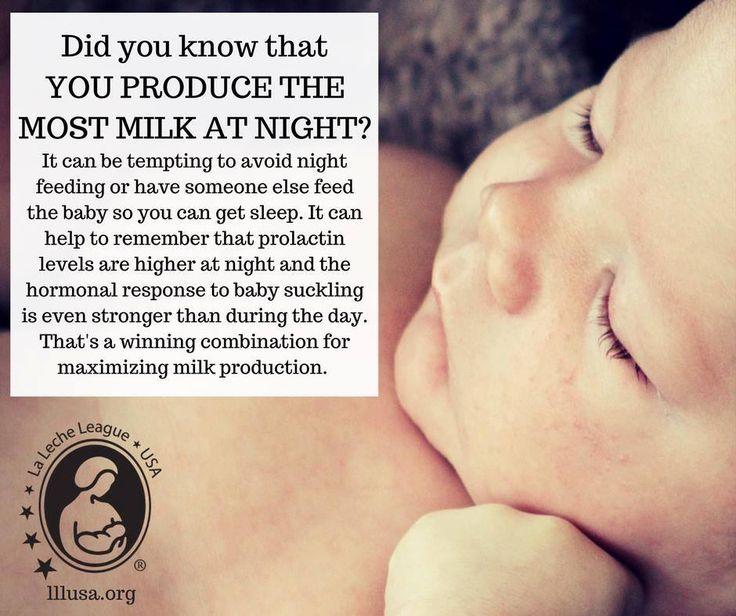 Hormones produced while breastfeeding also help you to relax and fall more quickly back to sleep, which may be why you find yourself nodding off so easily while breastfeeding.
Hormones produced while breastfeeding also help you to relax and fall more quickly back to sleep, which may be why you find yourself nodding off so easily while breastfeeding.
Given the fact that the hormones in night-time breastmilk help you and your baby to get back to sleep quickly, feeding babies to sleep is completely natural. A mother and baby’s bodies are designed to work in tandem this way. Breastfeeding your baby to sleep helps baby feel calm, safe and secure. Over time, babies stop falling asleep at the breast so easily, and eventually all babies or children stop needing the breast to fall asleep. Sleep is not a taught development, and all children get there in their own time. So, while breastfeeding to sleep continues to work, many mothers find it a wonderful, loving and responsive way to help their children doze off.
Breast-sleeping / Co-sleeping
Safely sharing a bed with your baby, or having your baby sleep very close to you in a sidecar cot or similar, is one way of getting more sleep and rest.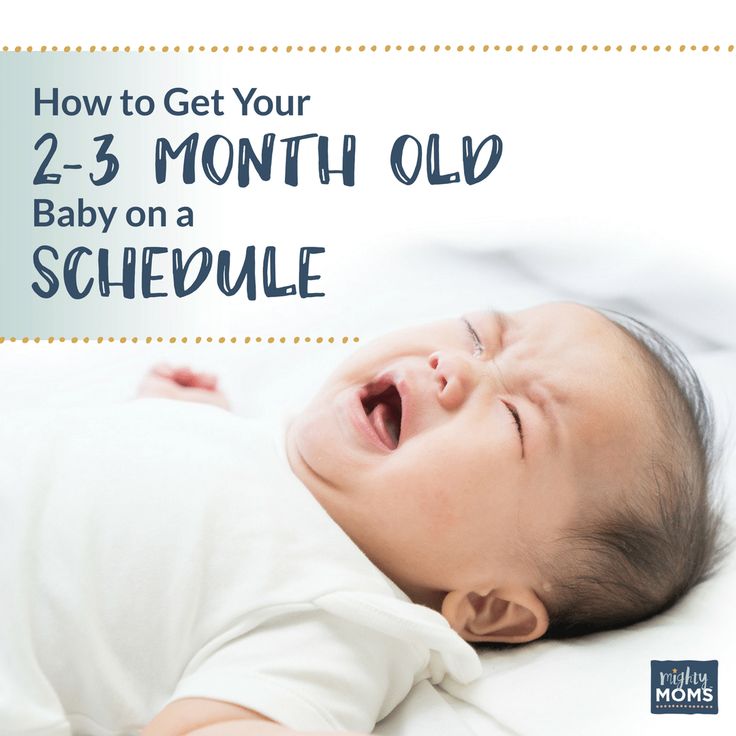 The majority of other mammals sleep with their young, and our own infants are hard-wired to expect this too. For many breastfeeding mothers, learning to feed lying down and being able to fall back asleep safely with baby is when things start to feel a lot more manageable at night. Some mothers may start out nursing their babies at night sat up in bed, but many soon find that mastering breastfeeding lying on their side can really help everyone to get more sleep, especially as baby gets a bit older and can latch on by themselves. Mums can feed from both breasts when lying on one side by simply tilting their body forwards more. The same principles for getting a comfortable, deep latch apply when side-lying as when feeding upright. It may take a little practice, but overall it’s easier and less disruptive for both mother and baby at night. Research shows that breastfeeding tends to be more successful overall for mothers that co-sleep than those that keep their baby separated from them at night.
The majority of other mammals sleep with their young, and our own infants are hard-wired to expect this too. For many breastfeeding mothers, learning to feed lying down and being able to fall back asleep safely with baby is when things start to feel a lot more manageable at night. Some mothers may start out nursing their babies at night sat up in bed, but many soon find that mastering breastfeeding lying on their side can really help everyone to get more sleep, especially as baby gets a bit older and can latch on by themselves. Mums can feed from both breasts when lying on one side by simply tilting their body forwards more. The same principles for getting a comfortable, deep latch apply when side-lying as when feeding upright. It may take a little practice, but overall it’s easier and less disruptive for both mother and baby at night. Research shows that breastfeeding tends to be more successful overall for mothers that co-sleep than those that keep their baby separated from them at night. You can read more about how to co-sleep or breast-sleep safely with your baby here
You can read more about how to co-sleep or breast-sleep safely with your baby here
Breastfeeding at night after the early months
Many mothers go through patches where their baby may wish to breastfeed more or less at night, especially within the first year. This will be related to a whole host of reasons, including growth spurts, teething, illness, and learning new skills such as sitting, crawling and walking. Like so much else with babies and children, the frequency of breastfeeds at night is not a linear progression. Phases of increased night feedings are usually relatively short-lived and you may find that co-sleeping is a really valuable tool for managing those phases. Increased periods of waking and breastfeeding around four-six months are very common and are not a sign that your baby is hungry and needs formula and/or solids. You can read more about this in our article ‘What happens at four months’
As your baby gets older and bigger, you may find that night feeding becomes much easier. While in the early days you may feel the need to switch on a light or sit up in bed in order to latch your baby comfortably onto your breast, as your baby gets stronger and learns to self-latch, feeding at night can be a simple matter of rolling over and putting the breast near your baby, who will manage the rest. Night feeds often become quicker too. Some mothers use breast compressions as a way of speeding up feeds. Being able to help their older baby back to sleep quickly with a breastfeed helps many mothers get the most sleep.
While in the early days you may feel the need to switch on a light or sit up in bed in order to latch your baby comfortably onto your breast, as your baby gets stronger and learns to self-latch, feeding at night can be a simple matter of rolling over and putting the breast near your baby, who will manage the rest. Night feeds often become quicker too. Some mothers use breast compressions as a way of speeding up feeds. Being able to help their older baby back to sleep quickly with a breastfeed helps many mothers get the most sleep.
Coping with the challenges
Knowing that waking at night to breastfeed is positive for our supply and our baby, and that it is the biological norm, can often be reassuring for mothers and parents. Nevertheless, sleep deprivation can be really challenging for many families. It can feel especially hard if your baby is waking more than your friends’ babies, or if they are an older baby still waking up more than you had expected.
New parents often get asked about their babies’ sleep and their approach to feeding at night.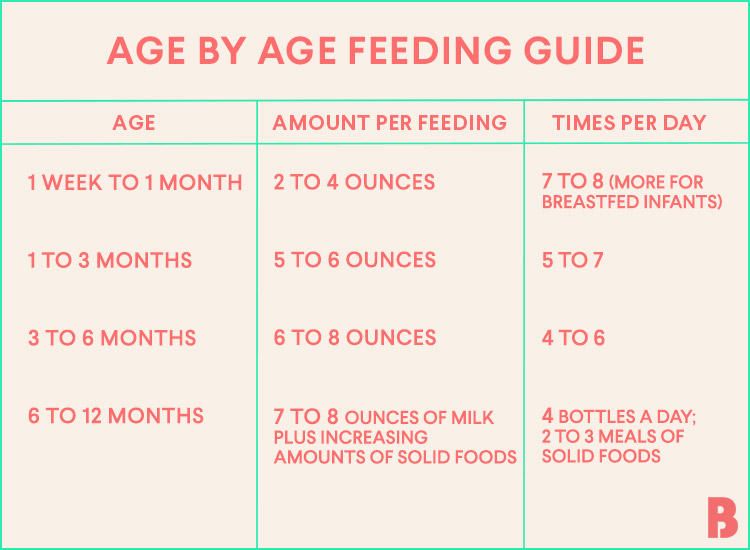 These conversations can sometimes lead to (unwanted) comments about what is normal, what you ‘should’ be doing, and how to ‘fix’ things. And if you are feeling really tired or at a low point, you may be thinking that you do need to find a ‘solution’ and try some of those suggestions. The many unhelpful sources out there setting unrealistic expectations may be undermining your self-confidence as a mother. Perhaps you’re wondering what a loving and respectful approach that suits both you and your baby would be?
These conversations can sometimes lead to (unwanted) comments about what is normal, what you ‘should’ be doing, and how to ‘fix’ things. And if you are feeling really tired or at a low point, you may be thinking that you do need to find a ‘solution’ and try some of those suggestions. The many unhelpful sources out there setting unrealistic expectations may be undermining your self-confidence as a mother. Perhaps you’re wondering what a loving and respectful approach that suits both you and your baby would be?
First, it’s important to say that you are not alone. At any point in time there are hundreds of thousands, if not millions, of mothers up and breastfeeding their babies – of varying ages – at night. A turning point for some of them is when they are able to relax their expectations of themselves and their babies a little. Some mothers also find that being constantly reminded of when they have been woken up is actually part of the problem, and they decide to ignore the clock and not to use their phones at night.
Being responsible for all the night-feeds can feel exhausting, or even unfair. Sometimes well-intentioned comments may suggest that a partner or other care-giver could feed the baby at night with a bottle. It can be useful to remember that the hormones in night-time milk make it easier for both you and your baby to get back to sleep quickly. And since the hormones in night-time milk are made at night-time, there is some evidence that giving your baby breastmilk expressed at other times does not always have quite the same effect. It is also sometimes easy to overlook the practicalities of another care-giver taking care of night-feeds. Mothers will often wake up when their baby does anyway, and may struggle to get back to sleep if they can hear their baby being upset while waiting for a bottle to be warmed up. Most mothers will also need to pump or hand express milk during the night to protect their supply and avoid engorgement, so they are often awake anyway during the time their baby is being fed by their partner.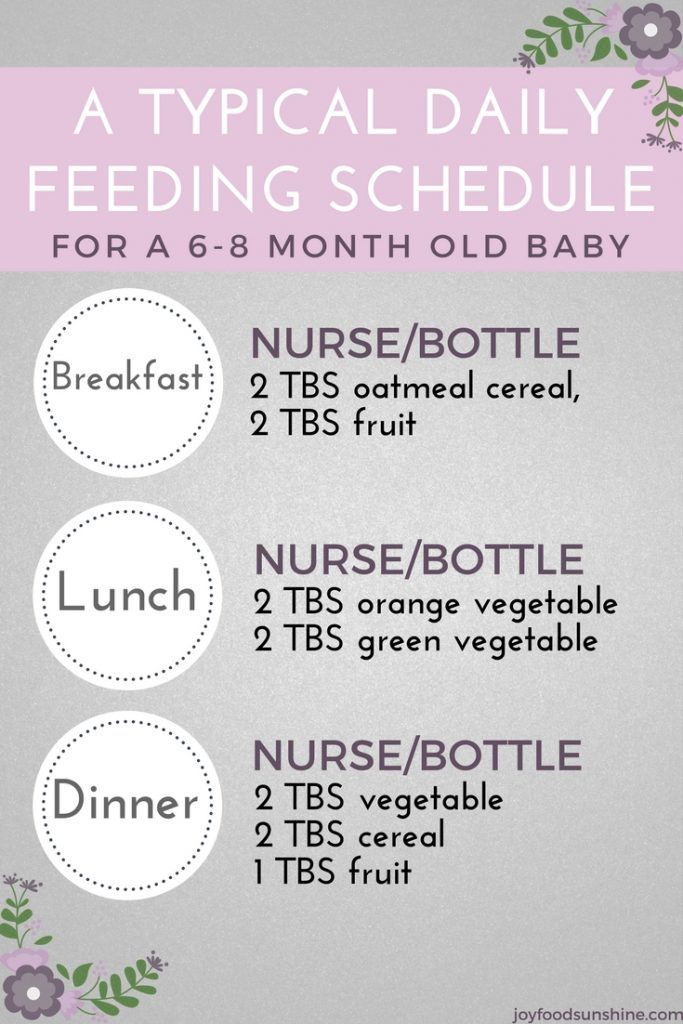
Even though breastfeeding at night may be the responsibility of the mother alone, there are lots of ways to get supported so that things feel easier. For example, sometimes dads and partners get up with the baby first thing in the morning to give mums some extra time in bed, which can make a big difference to how tired they feel. Good communication is really helpful – ask for help with other things where you can and be clear about the kind of support you need. It’s OK not to enjoy breastfeeding every second, and it’s OK to complain about being tired: that doesn’t mean you don’t want to do it, so you can explain that asking ‘Why don’t you just stop?’ is not helpful and that you’d rather be asked ‘How can I help you find time to rest today?’
If you are really struggling with tiredness, you may want to think of ways to adapt your own routines for a short while to help you get more rest – perhaps sleeping more during the day, or going to bed earlier when your baby has her first ‘longer’ stretch of sleep.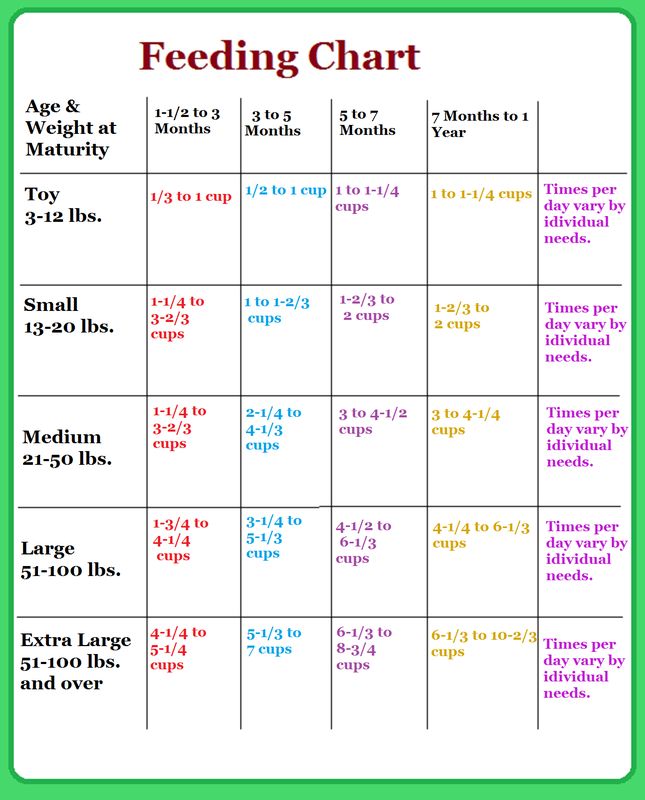 It can also be a great time to join an LLL group meeting with other breastfeeding mothers, as hearing that they are experiencing the same challenges can be really reassuring. Mothers often get bombarded with unrealistic expectations of infant sleep, and it’s precisely this misalignment of expectation and reality that can cause stress.
It can also be a great time to join an LLL group meeting with other breastfeeding mothers, as hearing that they are experiencing the same challenges can be really reassuring. Mothers often get bombarded with unrealistic expectations of infant sleep, and it’s precisely this misalignment of expectation and reality that can cause stress.
Another challenge that mothers may experience (usually once their baby is a bit older) is a feeling of nursing aversion or irritability, particularly during night-time feeds. These feelings can be very normal and are often linked to tiredness or feeling ‘touched out’. You may experience them more when your baby is waking or feeding a lot more frequently, for example when teething or feeling ill. You may also experience these feelings when there is a change in your own hormones, for example, during ovulation or your period. There is some anecdotal evidence that taking magnesium supplements can be helpful. Many mothers describe these feelings as irrational and usually short-lived; they can be a sign that you need to give yourself a little ‘self-care’ – perhaps asking for some more help during the day so that you can rest or focus on yourself.
Nursing aversion can sometimes lead to feelings of guilt about not enjoying breastfeeding, and make you wonder whether it is a sign you need to stop. There are some helpful information groups on social media where mothers share their nursing aversion experiences, as well as tips and tricks that helped them overcome those feelings. Like anything in life, you may not enjoy breastfeeding every moment of every day; that’s OK. Take things one day at a time, listen to your body and your baby.
Stopping breastfeeding at night
Breastfeeding at night meets a baby’s needs in a variety of ways. For many mothers, it’s the easiest way to settle their baby back to sleep when they wake at night, and they continue to use it for as long as it continues to work. It is not a bad habit and all babies eventually fall asleep and stay asleep without the breast. You may decide that you are happy with breastfeeding back to sleep, but you are feeling pressured by others’ expectations about what your baby ‘should’ be doing.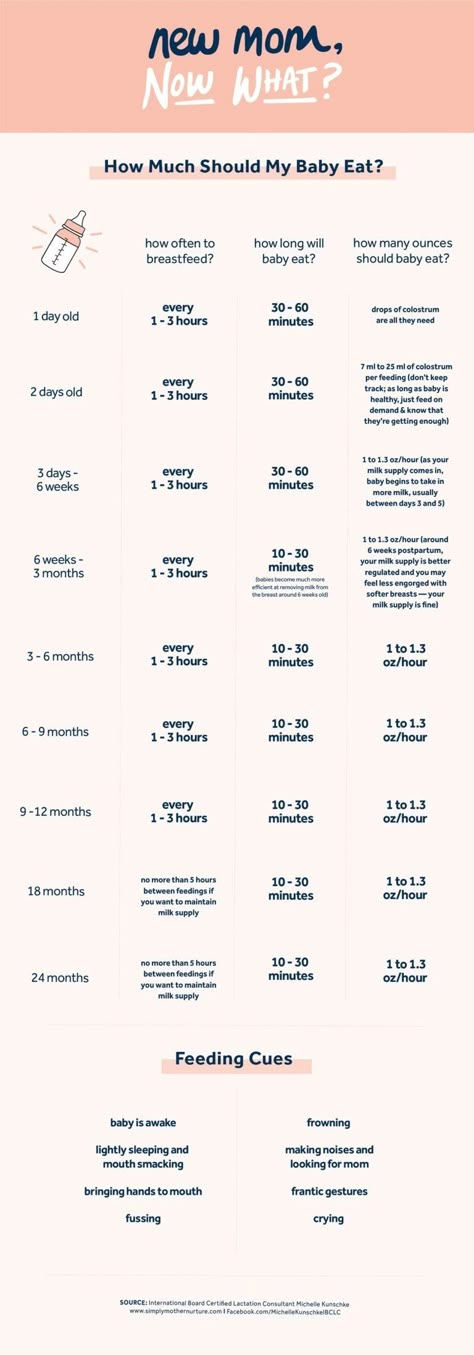
Some books suggest that after six months babies no longer need night feeds. Not only is this an arbitrary figure, taking little account of the different circumstances of different babies and families, but it also has no evidence to back it up. Sometimes, mothers worry that breastfeeding at night is what is causing their baby to wake up several times. This is not the case. Babies wake for lots of reasons and it is better to think of breastfeeding as a tool that meets the vast majority of those needs. Some sources claim that babies after a certain age don’t ‘need’ breastmilk at night any longer, but breastfeeding goes on meeting a baby’s needs for a long time. Many babies will continue to need the calories from night-time breastmilk, as well as all the other comforts that it brings, for some time after six months, and sometimes well beyond.
Some families may feel that their baby is ready to cut some breastfeeds at night or stop breastfeeding at night altogether. Generally speaking, the evidence seems to suggest that night-weaning is best left until after around 18 months.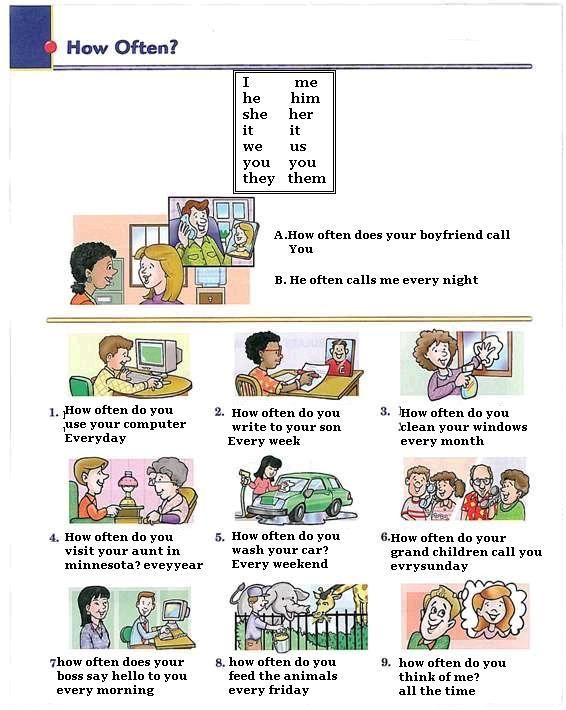 Many mothers find that gently cutting down feeds at this point is much easier, as the baby is learning to talk and the mother can help to explain any changes. There is helpful information about approaches to cutting down night feeds here. Any changes are best approached gradually and respectfully, so that you can preserve the important close connection to the baby at night-time. As your baby gets older, you will discover ways of being responsive to their needs at night that might not include offering your breast every time. For example, you may find that you are able to try other things like rocking, patting and shushing before offering the breast. These may not work initially, but over time, as your baby develops, you may find that in some cases these soothe him back to sleep. As always, you are the expert on your baby and you’ll be able to assess whether your child is ready to stop breastfeeding at night, or whether it would be easier to try night weaning later on.
Many mothers find that gently cutting down feeds at this point is much easier, as the baby is learning to talk and the mother can help to explain any changes. There is helpful information about approaches to cutting down night feeds here. Any changes are best approached gradually and respectfully, so that you can preserve the important close connection to the baby at night-time. As your baby gets older, you will discover ways of being responsive to their needs at night that might not include offering your breast every time. For example, you may find that you are able to try other things like rocking, patting and shushing before offering the breast. These may not work initially, but over time, as your baby develops, you may find that in some cases these soothe him back to sleep. As always, you are the expert on your baby and you’ll be able to assess whether your child is ready to stop breastfeeding at night, or whether it would be easier to try night weaning later on.
Conclusion
Having a baby, and eventually a toddler, can of course be exhausting.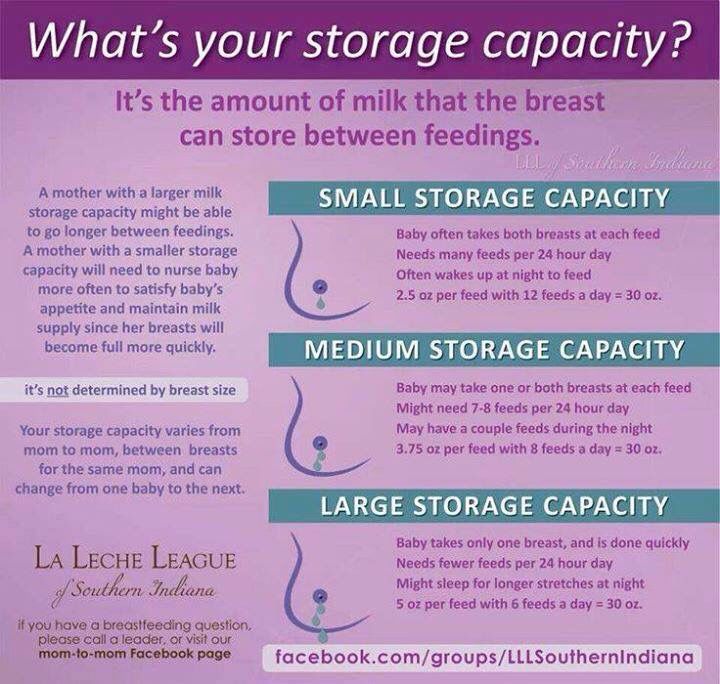 Since responding to your baby’s intense needs at night can feel overwhelming, being able to access reliable information about infant sleep and night-time feeding behaviour can help you adjust your expectations. You may be happy breastfeeding your baby back to sleep as often as needed, yet you may feel pressured by well-meaning comments from friends and family about what your baby’s sleep ‘should’ be like. Sometimes spending time with others who understand what you’re going through, and who are supportive or your choices, can help you feel confident to make the decisions that work for you. Chatting with other mothers at a La Leche League meeting, in person or online, about what they found helpful, and exchanging ideas for getting more sleep may help you decide what’s right for you and your baby. Never forget that you know your baby best!
Since responding to your baby’s intense needs at night can feel overwhelming, being able to access reliable information about infant sleep and night-time feeding behaviour can help you adjust your expectations. You may be happy breastfeeding your baby back to sleep as often as needed, yet you may feel pressured by well-meaning comments from friends and family about what your baby’s sleep ‘should’ be like. Sometimes spending time with others who understand what you’re going through, and who are supportive or your choices, can help you feel confident to make the decisions that work for you. Chatting with other mothers at a La Leche League meeting, in person or online, about what they found helpful, and exchanging ideas for getting more sleep may help you decide what’s right for you and your baby. Never forget that you know your baby best!
Written by Rhiannon Butterfield, LLL Cambridge. February 2021
Endnotes:
i Baby Sleep Info Source (BASIS) – Durham University
ii Brown A, Harries V.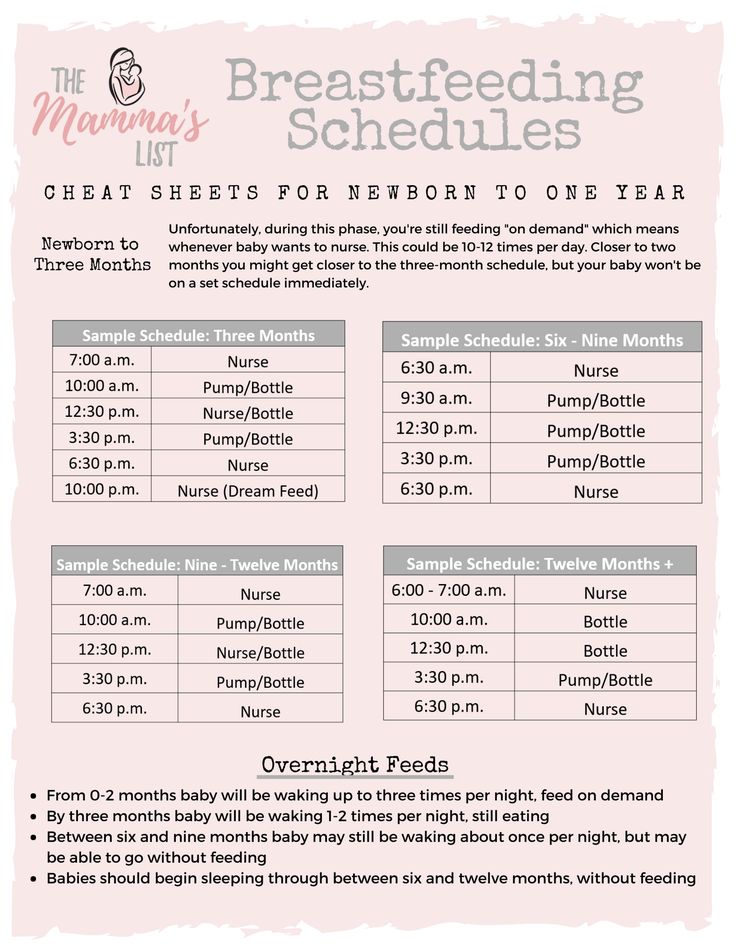 Infant Sleep and Night Feeding Patterns During Later Infancy: Association with Breastfeeding Frequency, Daytime Complementary Food Intake, and Infant Weight. Breastfeeding Medicine. 2015;10(5):246-252.
Infant Sleep and Night Feeding Patterns During Later Infancy: Association with Breastfeeding Frequency, Daytime Complementary Food Intake, and Infant Weight. Breastfeeding Medicine. 2015;10(5):246-252.
iii https://gpifn.org.uk/sleep-and-safe-sleeping/
Further reading:
Safer Sleep and the Breastfed Baby
I need some sleep!
LLLI: Safe Sleep Seven
The reasons why nightwaking is the biological norm
Letting babies cry: the science behind the studies
Sweet Sleep available in our LLLGB Shop
until what age to feed a baby at night
Breast milk is the ideal food for babies, so every mother should strive to maintain breastfeeding for as long as possible. But if for some reason it is impossible, it is important to choose high-quality breast milk substitutes and the optimal feeding regimen, close to the natural rhythm of breastfeeding. The younger the baby, the more often he needs food. Newborn children need to be fed several times at night, older children, from about six months, once.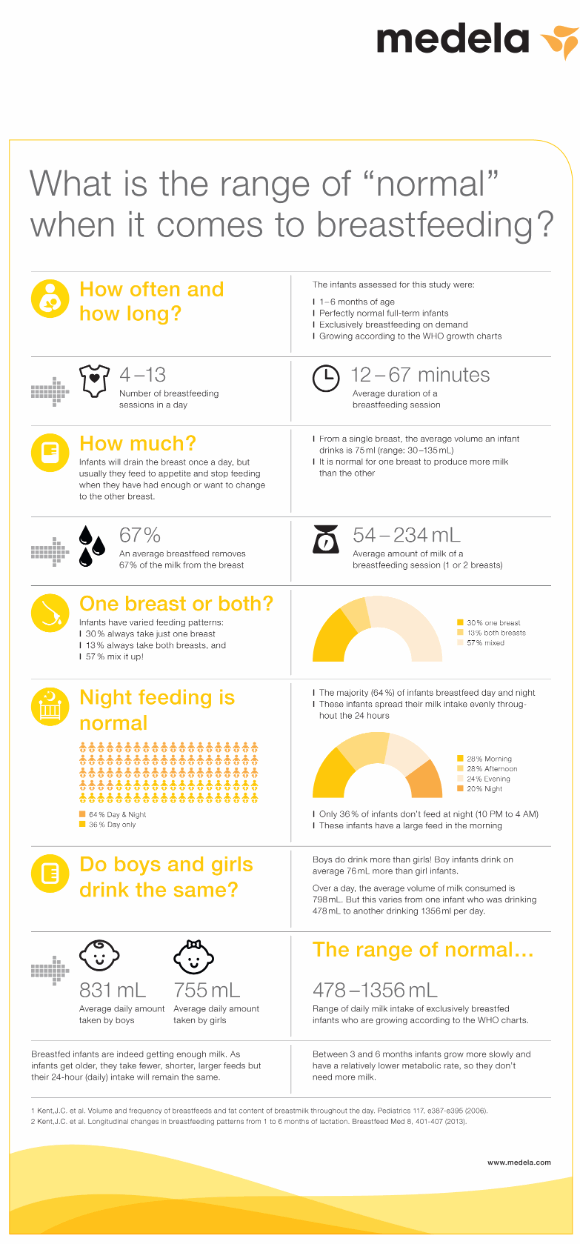 After a year, children can already sleep at night without waking up for feeding.
After a year, children can already sleep at night without waking up for feeding.
Why do newborns eat at night?
In the womb, the baby receives nourishment through the umbilical cord continuously, without separation between day and night. After birth, the volume of the baby's stomach is very small, so he cannot get enough nutrients and vitamins and minerals at one meal. Therefore, the baby needs to eat often, in small portions, so that there is no regurgitation and digestive problems.
Another argument in favor of frequent feedings is a very intensive metabolism in an infant. This is necessary to provide the body with the necessary building blocks and energy during a period of very rapid growth and development. In the first year of life, growth processes are maximum in speed, and in order for a baby to triple its weight by a year and grow by 50% of its original height, it needs to eat often and a lot.
Proper nighttime feeding of babies
Even 20 years ago there was a recommendation to maintain a break at night (from midnight to six in the morning), not to feed the baby.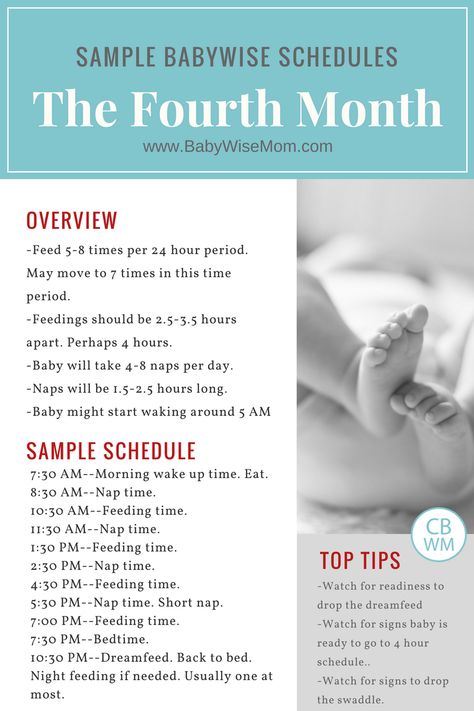 This was explained by the fact that the stomach needs rest, and you need to “deceive” it with some water or give it a pacifier. But today it is already known for sure that the stomach is equally active both during the day and at night. In early childhood, circadian rhythms have not yet been formed and the digestive system works around the clock.
This was explained by the fact that the stomach needs rest, and you need to “deceive” it with some water or give it a pacifier. But today it is already known for sure that the stomach is equally active both during the day and at night. In early childhood, circadian rhythms have not yet been formed and the digestive system works around the clock.
Today, doctors recommend feeding a newborn on demand - he himself determines when to eat and how much milk to suck out for feeding. In the first 2-3 months, a child can wake up up to 3-4 times a night (between 9 pm and 6 am) to attach to the breast, up to six months - up to three times, after six months - once, less often twice.
- When breastfeeding, it is recommended to feed the baby on demand, including at night, giving up the practice of "hungry" motion sickness, the use of pacifiers or water.
- For mixed-fed babies at night, breastfeeding should be preferred. This will also help stimulate lactation in order to increase the amount of milk secreted during the day.
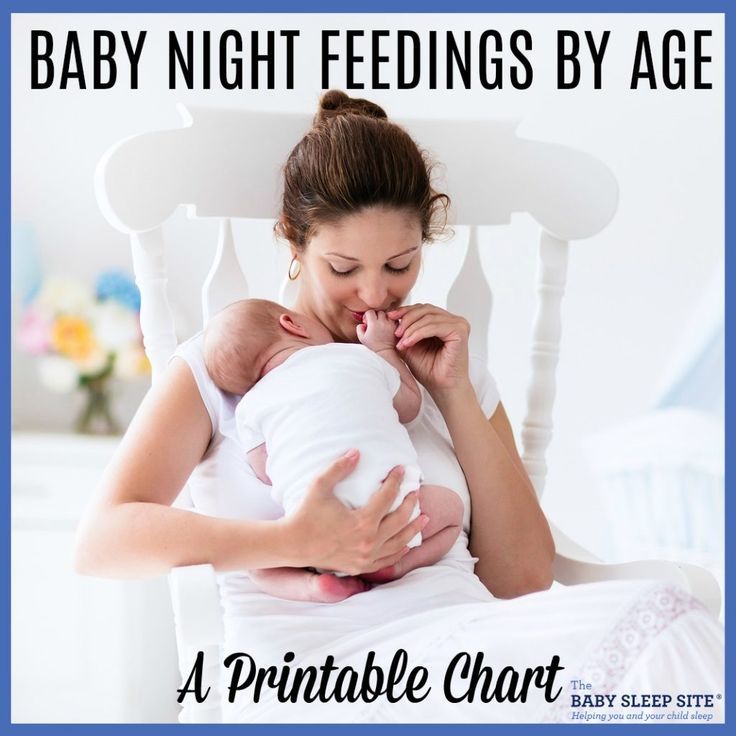
- Formula-fed infants should be fed every 3 hours. Let's say a break of 4-5 hours if this is a child older than 3-4 months.
Until what age should I feed my baby at night?
Many parents think that as complementary foods are introduced, the baby no longer needs nighttime feedings, because he can be fed during the daytime. Yes, of course, the baby already receives more dense food - vegetable, cereal, meat complementary foods. But this does not mean at all that he will not want to eat at night.
In the daytime, children eat a variety of complementary foods, and at night they have a need to attach to the breast, to get enough of breast milk. After all, the number of attachments to the breast in the daytime gradually decreases, and babies can compensate for this by waking up at night to feed.
If a child is breast-fed, he may have 1 to 3 nightly feedings until the end of lactation (to fall asleep, actually at night, to calm down and fall asleep).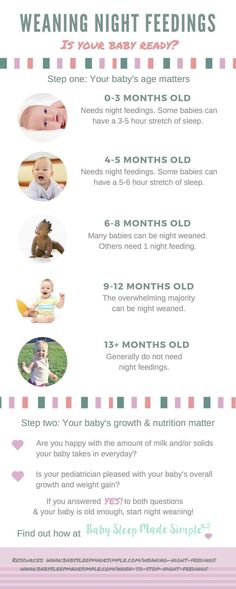 If a child is on artificial nutrition, after a year, milk formulas are almost replaced by other products. Most often, children drink cow's milk or fermented milk products at night, special mixtures for children of the second year of life (“threes” or “fours”).
If a child is on artificial nutrition, after a year, milk formulas are almost replaced by other products. Most often, children drink cow's milk or fermented milk products at night, special mixtures for children of the second year of life (“threes” or “fours”).
Most children under three wake up at least once during the night to eat. This is quite normal and does not require any radical intervention from the parents.
Should my baby be weaned from night feedings?
This issue is quite complex and it is solved individually. Up to a year, if the child himself does not refuse night feedings, they should not be removed. After a year, this issue must be addressed individually, based on indicators of height and weight, the level of physical and neuropsychic development. If the baby was born prematurely or gained weight at the lower limits of the norm in the first year of life, it is worth leaving feeding in the second year so that the child receives more nutrients for growth and weight gain.
If a decision is made to wean a child from night feedings, one should not take radical measures, arrange battles with crying and tantrums. It is not worth practicing methods of the “cry and stop” type, they negatively affect the psyche, disrupt the baby’s sleep, provoke capriciousness, irritability. Night tantrums will not benefit other family members either.
To wean a baby from night feedings, it is necessary to create conditions when the child does not want to eat during the night. This is achieved by eating porridge in the evening, before going to bed. Complex carbohydrates are absorbed slowly, so the baby stays full longer, can sleep through the night without waking up. New, unfamiliar complementary foods should be introduced in the morning to help reduce the risk of negative reactions to food that occur at night and disrupt sleep. You should not give your child meat dishes at night, as they contain protein compounds that are heavy enough for digestion.
Sometimes children wake up at night not because they are hungry, but because they are thirsty. Dry and warm air leads to drying of the mucous membranes, which causes dryness in the mouth, thirst arises. Therefore, when the crumbs wake up, you can drink it with water at room temperature. If the baby fell asleep and does not wake up anymore, it's not about hunger. If after a few minutes he wakes up again - you need to feed the baby.
Dry and warm air leads to drying of the mucous membranes, which causes dryness in the mouth, thirst arises. Therefore, when the crumbs wake up, you can drink it with water at room temperature. If the baby fell asleep and does not wake up anymore, it's not about hunger. If after a few minutes he wakes up again - you need to feed the baby.
How to wean a child from night feeding, wean a child to eat at night
Contents
Should I feed my baby at night How many night feeds does my baby need
- For breastfed, formula-fed and reflux babies
- For formula-fed babies
mealsHow to wean a child from night feedings: expert advicePopular questionsResources
Should I feed my baby at night
Feeding a newborn at night is something that is so difficult for many new parents: it is difficult to maintain your own health, feel good and at the same time take care of the baby if you are chronically sleep deprived. But why can't a baby go without food at night?
But why can't a baby go without food at night?
In the first months, the baby does not have a clear regime, he still weakly distinguishes between day and night: during prenatal development, the baby is used to getting everything he needs from his mother at any time. And most importantly - at the beginning of life, the child grows very quickly and requires a lot of nutrients, while having a small stomach and a still fragile digestive system. For these reasons, the baby cannot go without food for a long time and requires food approximately every 2-3 hours, and pediatricians, in turn, insist on the need for nightly breastfeeding of a newborn.
Important!
Sleep and eating habits, as well as the need for them, are individual for each child. Therefore, if it seems to you that the baby eats little and rarely, or vice versa - too often, consult with the doctor you are seeing.
In addition, night feedings, although they interfere with sleep, are useful not only for the child, but also for the mother.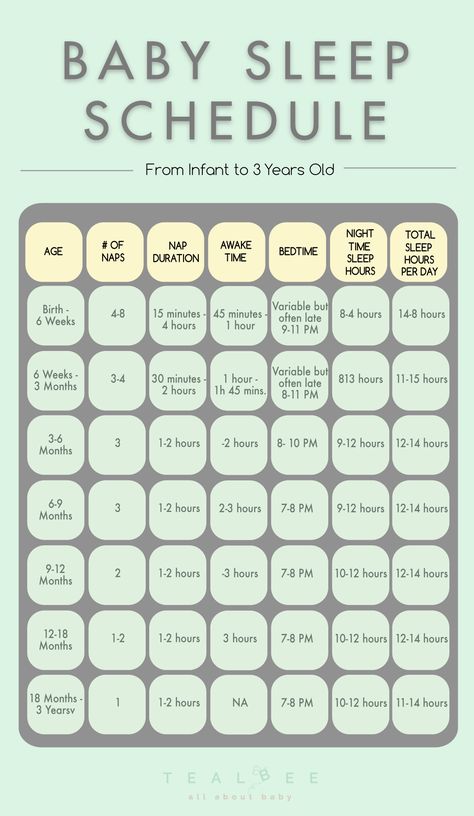 They help to properly establish lactation, because it is at night that the hormone prolactin is produced, which is responsible for the amount of breast milk.
They help to properly establish lactation, because it is at night that the hormone prolactin is produced, which is responsible for the amount of breast milk.
Read also Establishing breastfeeding is one of the priority tasks in the first days after childbirth
Tip
With proper organization of night feedings, the baby eats half asleep and quickly falls asleep further. To do this, start a night light in the room and be ready to feed as soon as the baby wakes up. Sleep in comfortable nursing clothing if you are breastfeeding.
How many night feeds does a baby need
The smaller the child, the more often he needs to be fed. But over time, the digestive tract gets stronger, and the baby can eat more and endure longer breaks between meals. Below is an approximate number of night feedings, depending on the age of the baby:
1. For breastfeeding, combination breastfeeding, and infants with reflux:
Age
Number of nightly feedings
0-3 months
Breastfeeding on demand approximately every 2-3 hours
3-3 4 months
2-3 times on demand or every 3-6 hours
5-6 months
1-2 feedings
7-9 months
1, possibly 2 times
10-12 months
sometimes 1 feeding
12+ months
usually no night feedings
3-4 months
1-2 times a night or every 3-6 hours on demand
5-6 months
possible, 1 feeding
7+ months
usually no night feedings
See also: Healthy eating: how much should a child eat before the age of one?
Important!
During growth spurts, your baby should be fed as needed.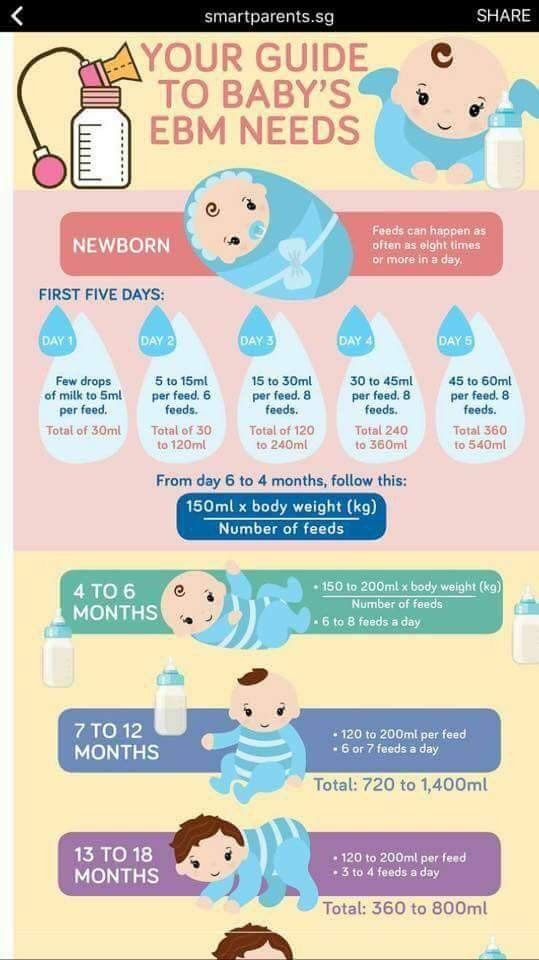 Such bursts occur at about 5, 8, 14, 19, 26, 37 and 46 weeks of age and last about 7 days.
Such bursts occur at about 5, 8, 14, 19, 26, 37 and 46 weeks of age and last about 7 days.
How do you know if your baby is ready to give up nighttime meals? After this period, the need for nightly meals depends on the pace of development, individual needs and the health of the child. If the baby was born prematurely or is not gaining weight well, experts recommend waking him up 3.5-4 hours after the previous feeding and offering the breast.
Advice
If you're not sure if your baby is ready to stop feeding at night, talk to your doctor. The specialist will help you understand and make the right decision based on the physical indicators of your child.
If the baby is healthy and has a good weight, somewhere between 4 and 6 months old, he will begin to get enough calories during the day so that he does not need to feed at night. In breastfed children, this process may be a little slower - up to 6–10 months [2].
It is also important to take into account that the refusal of nighttime "snacking" occurs gradually: there are very few cases when a child stops eating at night and immediately starts sleeping 5-6 hours in a row. Usually, babies who are used to eating several times a night wake up out of habit, and it will take time to change this routine. First, the baby will ask for food half an hour later than usual, then an hour, a little later - two, and so on. Step by step, over several weeks, night sleep reaches 6-7 hours in a row. This joyful moment can come at 4 months or closer to 12 months: all babies are unique, and it's not scary or unusual for an infant to sleep much longer without food, while an older child keeps waking up to eat.
Usually, babies who are used to eating several times a night wake up out of habit, and it will take time to change this routine. First, the baby will ask for food half an hour later than usual, then an hour, a little later - two, and so on. Step by step, over several weeks, night sleep reaches 6-7 hours in a row. This joyful moment can come at 4 months or closer to 12 months: all babies are unique, and it's not scary or unusual for an infant to sleep much longer without food, while an older child keeps waking up to eat.
Advice
Dentists recommend avoiding nighttime feedings for children older than one year, as food leftovers in the mouth can damage milk teeth. This risk is minimal when breastfeeding.
Also, remember that a child has many other important needs. Perhaps he wakes up and calls you, not so much for food, but for comfort and closeness. What could be more reassuring and safer than the caring hands of parents who feed and cradle?
Read also: Stages of development of the child's psyche up to a year.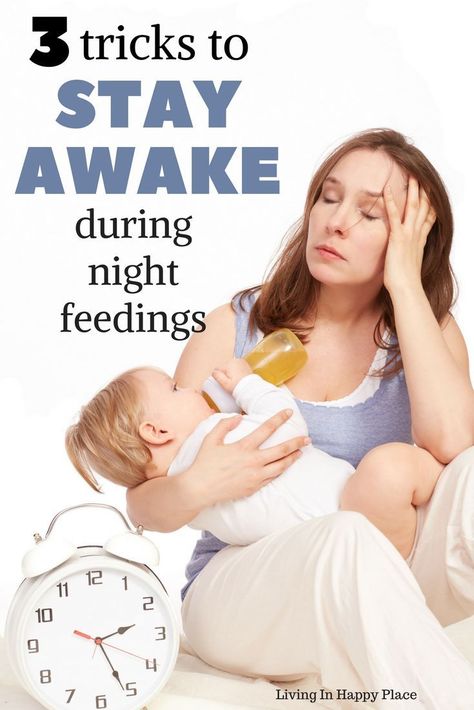 Conditions for adequate development. Mother's role
Conditions for adequate development. Mother's role
How to wean a child from night feeding: expert advice
Many parents are interested in how to properly wean a baby from eating at night so that it does not become a lot of stress for him. Especially if the baby stubbornly refuses to give up night feeding.
- Start the weaning process slowly and gradually. Slowly reduce your nightly breastfeeding time or give your baby less milk (mixture if formula-fed) from a sippy cup. Try to extend the intervals between feedings.
Important!
Under no circumstances should the issue of night feedings be turned into a battlefield. The “cry - stop - wean” method loosens the baby’s nervous system and can provoke severe stress.
- Make sure your child eats well during the day. Babies become more active as they get older, and if they get carried away playing or walking, they may skip meals or not eat enough and then try to make up for it at night.
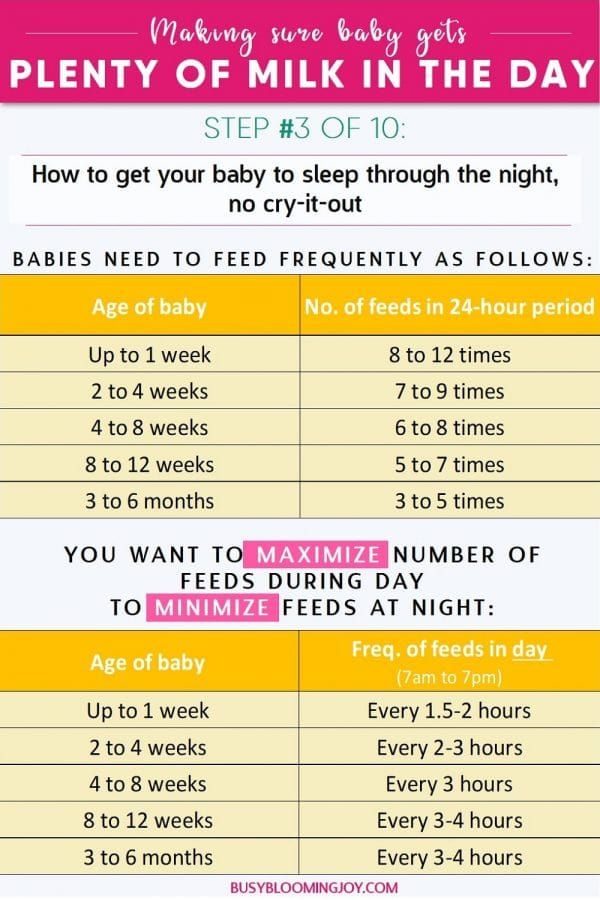 Therefore, take scheduled breaks during the day for "silent feeding" in a place where nothing will distract the crumbs from eating.
Therefore, take scheduled breaks during the day for "silent feeding" in a place where nothing will distract the crumbs from eating.
Advice
If you're not sure your child is eating enough, check their height by having them weighed at the doctor's office.
- Try feeding your baby before bed. If a child goes to bed with a full tummy, they are less likely to wake up hungry in the middle of the night.
- Ask dad to wake up at night. If an awakened baby hears your smell or the aroma of breast milk, this can provoke his appetite, even if the baby did not wake up because of hunger. If you sleep in the same room, it's best to move the crib to dad's side.
- Phase out feedings one at a time. When the baby wakes up to eat at night, go to him and reassure him, gently but firmly explain that now is the time to sleep, not eat. At the same time, pat and stroke the child on the back or tummy, but do not pick him up. Even if the baby does not yet understand your words, he gradually catches the meaning, and your presence and attention will be soothing to him.
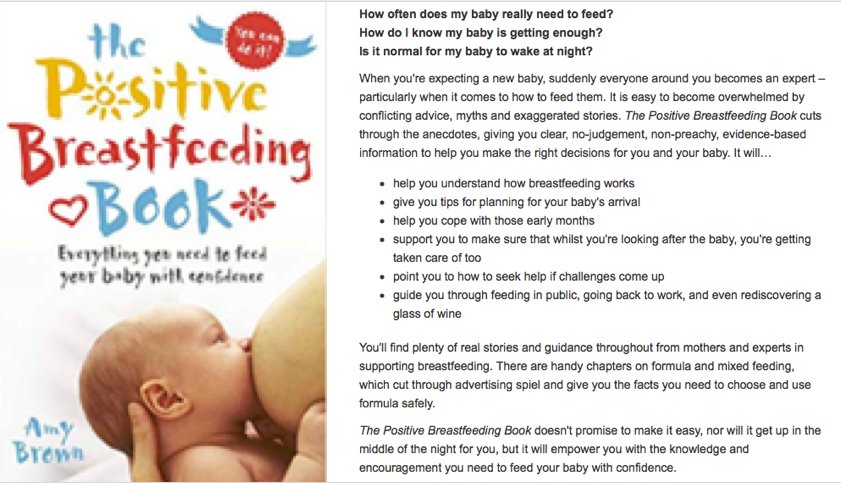
See also: How to calm the baby?
- Try giving your baby water to drink. Babies may wake up at night not from hunger, but from thirst, especially in hot weather or in a room with dry air. If after half an hour the baby wakes up again, feed him, and if not, then he is full and satisfied.
- If the baby has been crying inconsolably after stopping night feeds for several days in a row, stop the attempt and return to your normal routine for a while. Let the baby calm down and start weaning him again in a week or two.
- Do not stop night feedings during the transition period. For example, when you are going to return to work or go on vacation without a baby. If your baby sees less of you during the day, try to hug and interact with him more in your free time. It is necessary that he clearly feels your connection and care, then the baby is less likely to seek solace in the middle of the night.
- If the baby continues to require nighttime feedings, try to create conditions in which he does not want to eat.
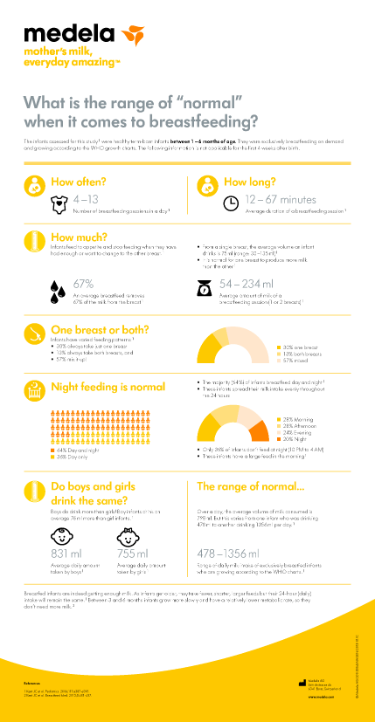 A great opportunity appears at 8-9months, when the baby is already confidently eating complementary foods. To do this, move the usual bowl of porridge to the evening: this way the child stays full longer and may not ask for an extra portion of food at night.
A great opportunity appears at 8-9months, when the baby is already confidently eating complementary foods. To do this, move the usual bowl of porridge to the evening: this way the child stays full longer and may not ask for an extra portion of food at night.
See also: Introducing complementary foods to a baby
Advice
Do not give your baby new complementary foods at night, introduce them only in the morning. Otherwise, you run the risk of observing the reaction to unfamiliar complementary foods instead of sleep. Also, do not give your child meat at night, it is hard to digest, can cause discomfort in the stomach and restless sleep.
Also keep in mind that the decision to not feed at night depends in part on how it affects you. If you enjoy breastfeeding or drinking from a cup at night, there is no reason to stop: at a certain point, the baby will stop asking for food on its own. But if you feel that lack of sleep prevents you from living and enjoying motherhood, and the baby is already physically ready for change, it's time to try switching to a daily routine. In any case, you should do what is best for you and your family.
In any case, you should do what is best for you and your family.
FAQ
1. How often should a newborn be fed?
A newborn needs to be fed every 2-3 hours, i.e. 10-12 times a day. Further, the intervals between feedings gradually increase to 3-6 hours, and the child gets the opportunity to sleep all night.
2. How much should a child eat per day?
The daily "portion" of food for the baby depends on his age and weight. From 10 days to 1.5 months, the baby needs such an amount of food, the weight of which is approximately 1/5 of the child's body weight. From 1.5 to 4 months - 1/6 of the baby's weight, from 4 to 6 months - 1/7, from 6 to 8 months - 1/8, from 8 to 12 months - 1/9.
3. What happens if you don't stop night feedings?
Most likely, the child will eventually refuse them himself. But some pediatricians, notably Richard Ferber [1], warn that unnecessary nighttime feedings can cause sleep problems. Also, food leftovers after late “snacks” can provoke the development of caries in milk teeth.